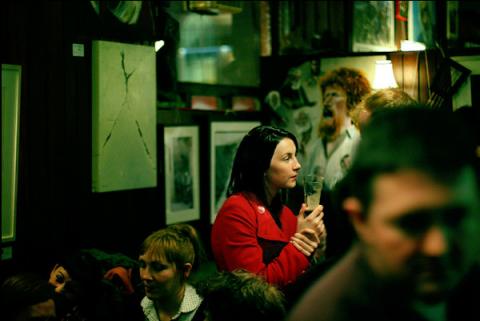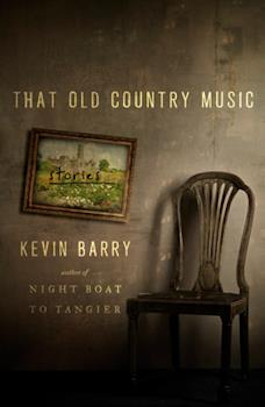Love, Death, and the West of Ireland in ‘That Old Country Music’

That Old Country Music
By Kevin Barry
Doubleday
191 pages
Over the years, the small country of Ireland has produced a disproportionate number of great novelists and short-story writers. In addition to gods of literature like Joyce and Beckett, there’s a bounty of very talented Irish writers at work today, from Edna O’Brien, Roddy Doyle, and Colm Toibin to relative newcomers like Colin Barrett and Sally Rooney.
High up in that pantheon is another wonderful writer named Kevin Barry.
I've sung the praises of County Sligo resident Kevin Barry here, and here, and yet again here. Barry’s voice is raunchy, lyrical, entirely submerged in the Irish storytelling tradition, and often laugh-out-loud funny. Not many writers combine so many different tonal registers, while also entrancing us with ever more beautiful prose.
So, with his new story collection, That Old Country Music, is there any diminution of powers or an unfortunate slide into self-parody?
The answer is no. There is, however, a deeper, more mature voice emerging in this recent work.

In the opening story, “The Coast of Leitrim,” a love affair between down-on-his-luck Seamus and a Polish girl named Katherine seems both improbable and increasingly despairing. But (minor spoiler alert) the ending comes abruptly buoyed with fresh hope, and in some respects that’s a new direction for the author.
In “Old Stock,” a haughty young man inherits his black-sheep uncle’s cottage in the West of Ireland. As his uncle predicts on his deathbed, women who visit this remote cottage mysteriously “lose all inhibition to the menfolk.” But there’s trouble in paradise when the young man shares dinner with a potential female admirer:
“There had already been a difficult moment when she ordered [her steak] well-done and I asked if she had a fear of blood, and it was possible that I had a haughty or even a sniggering tone. Away from Aldo’s cottage, the level of my suavity was again in terrible deficit. There was no question of a third time out—the poor girl practically hurdled the waiter as she ran from the place. Maybe it had not been the best idea to get into my suicide attempt over the coffee.”
It’s true, in some stories, not a lot seems to happen. But the sheer joy of the dialogue—Barry wields a playwright’s skill in back-and-forth exchanges—overrides our petty need for a plotline.

In “Toronto,” mother-and-son barflies address the world’s problems in an otherwise empty bar. Of their most recent tawdry sojourns, the mother obliquely remarks, “We were rather run out of town.” As in much of Barry’s work, heavy drinking comes into play, often with dire consequences. This sharp-talking duo makes for delightfully charming and unpredictable fictional companions.
In “Ox Mountain Death Song,” Barry goes into “hard-boiled” mode, but only insofar as a policeman hunts an evildoer in a desolate, haunted region. Sgt. Tom Brown, fat and nearing retirement, pursues Canavan, the latest in a long line of bad guys who haunt the Ox Mountains: “The witch hazel of the eyes and the sulphur of the smirk—these betrayed to the sergeant that young Canavan would at some future point kill.”
All the logistics of noir are there—the setup, slow burn, final showdown—and a thrilling act of justice as only a writer of his caliber could tell it.
Not all stories in That Old Country Music resonate with the same impact as masterworks like “Ox Mountain Death Song,” and “The Roma Kid,” a stunning account of an immigrant girl’s life. But throughout the collection, you won’t find a badly written page, even a substandard paragraph. That’s how good this writer is.
Still unconvinced? Pick up this story collection, or Kevin Barry’s novel, Night Boat to Tangier (2019) and start reading. You may not be able to stop.
Author Bio:
Lee Polevoi is Highbrow Magazine’s chief book critic. His new novel, The Confessions of Gabriel Ash, will be published in 2022.
For Highbrow Magazine
Image Sources:
--Frederic Poirot (Flickr, Creative Commons)
--Doubleday
--Luca Sartoni (Flickr, Creative Commons)































































































































































































































































































































